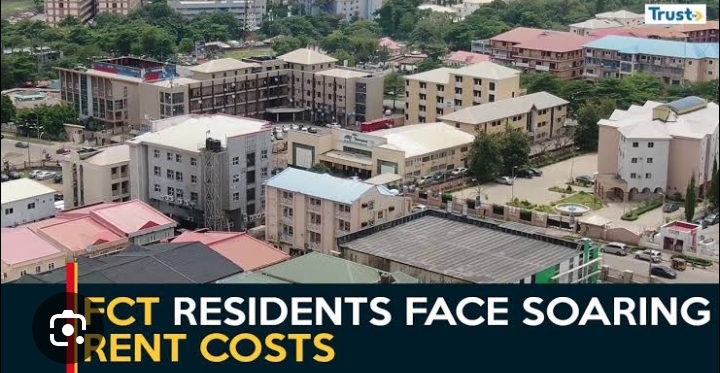By Ameh Gabriel
Abuja, Nigeria’s bustling Federal Capital Territory, is famed for its wide roads, planned estates, and the seat of political power. But beneath the skyline of rising structures and luxury apartments lies a pressing concern that keeps residents awake at night: the skyrocketing cost of house rent.
From Lugbe to Gwarinpa, Kubwa to Apo, and even the satellite towns of Karu, Nyanya, and Kuje, tenants are groaning under the weight of rent hikes that appear relentless.
“It is like paying rent has become a punishment,” says a tenant in Lugbe
Mrs. Anthonia Obaje, a civil servant, lives in a two-bedroom apartment in Lugbe. She told Housing TV Africa reporter that her rent was increased from ₦550,000 to ₦100,000 within two years.
“My salary has not changed, but the landlord keeps increasing the rent every renewal. Sometimes I wonder if I should move farther away from the city, but the transport cost will also eat deep into my income. It’s like we are trapped,” she lamented.
Satellite Towns No Longer Safe Havens
Even areas once considered affordable are no longer safe havens for the average income earner. In Karu and Nyanya, rents for single room self contained apartments now hover between ₦250,000 and ₦350,000 annually almost double what they were three years ago.
Mr. Idris Mohammed, a commercial motorcyclist in Nyanya, explained:
“I used to pay ₦120,000 for my one-room in 2020. Now the same landlord is asking for ₦280,000. I may not be able to renew. The landlords are just doing what they like because they know we don’t have many options.”
Why Are Abuja Rents So High?
Experts and real estate operators say several factors are fueling the surge:
1. Inflation and Rising Cost of Building Materials: According to the National Bureau of Statistics (NBS), headline inflation stood at 28.9% as of July 2025, with construction materials leading the surge. Cement prices have risen to ₦9,000–₦10,000 per bag, while iron rods, roofing sheets, and tiles have doubled or tripled in the last five years.
2. Housing Deficit: Nigeria’s housing deficit is estimated at over 22 million units, with Abuja alone needing more than 2 million affordable housing units. Demand far outweighs supply.
3. Weak Regulation: Unlike countries with rent control laws, Nigeria’s housing sector is largely unregulated. Landlords increase rents arbitrarily without fear of sanctions.
4. Urban Migration and Security Concerns: Abuja remains one of the safest cities in the North, leading to an influx of displaced families from crisis-prone states, further straining housing supply.
5. Dollarization of Rent: In high-brow areas like Maitama, Asokoro, and Wuse 2, landlords often peg rents in dollars, influenced by expatriates and diplomats. This has indirectly pushed up prices in other districts.
The Human Cost of Rising Rents
The statistics are sobering, but the real impact is on everyday people. Students in Bwari and Gwagwalada complain of being squeezed out of hostels. Families are forced to downsize from three-bedroom flats to single-room apartments. Some workers now take salary loans yearly just to pay rent.
A taxi driver in Gwarinpa, who gave his name as Eze, put it bluntly:
“Paying rent in Abuja is like working only for your landlord. If the government does not intervene, many people will become homeless.”
Possible Solutions
Housing experts and urban planners believe solutions are within reach if authorities act decisively:
Rent Control & Tenancy Laws: States like Lagos have tenancy laws. The FCT urgently needs a framework to prevent arbitrary increases.
Affordable Housing Schemes: Expansion of government-backed low-cost housing estates and revival of Federal Housing Authority (FHA) projects.
Public Private Partnerships (PPP): Tax incentives and subsidies to encourage developers to build affordable housing.
Mortgage Systems: Creating low-interest mortgage options so more Nigerians can own homes rather than pay lifetime rent.
Infrastructure Expansion: Developing satellite towns with better roads, rail, and utilities to make cheaper housing areas attractive.
The Call for Urgent Action
With Abuja rents reaching unsustainable heights, analysts say urgent intervention is needed to avoid a housing crisis. Citizens interviewed by Media360Impact appealed to both the federal and FCT authorities to prioritize housing as a social necessity, not just a commercial venture.
For many residents, the dream of living decently in Nigeria’s capital is fading fast. Unless bold steps are taken, the city’s towering apartments may continue to rise but so too will the struggles of those who call Abuja home.
Abuja’s Soaring Rents: Struggles, Causes, and the Search for Solutions




